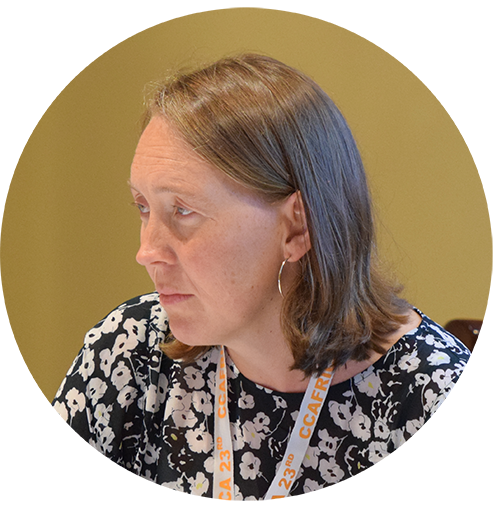Understanding flows of antimicrobial resistance through the food supply chain

Actions to mitigate the potential for the food supply chain to act as a conduit from the myriad environmental sources of antimicrobial resistance to the public health problems of antimicrobial resistant infections in people generally focus on two areas. First, effective antimicrobial stewardship to reduce the use of antimicrobials in agriculture; and second, surveillance of antimicrobial resistance in pathogens in food. In the presentation of their recent research to the first side event at CCAFRICA23, Professor Alex Hughes (above) of Newcastle University, UK and Dr Emma Roe (right) of University of Southampton, UK challenged us to think more about the ‘hidden middle’ of the food supply chain in food processing, wholesale and logistics. They pointed to insights that might be generated from geography, economics and the social sciences into opportunities for impactful interventions to counter the flows of antimicrobial resistance through global food supply chains. They also urged further data sharing and collaboration, to help address these complex issues.
Alex and Emma were also able to give us a preview of their next piece of work in this area, due to start next year, which will work with colleagues from Kenya, Malawi and the UK to design approaches to antimicrobial stewardship that are sensitive to the cultural and economic contexts of poultry farming in different national settings. We look forward to hearing more!
Steve Wearne
Director of Science at UK Food Standards Agency and Vice-Chair of Codex Alimentarius Commission
Read more
At the heart of the Codex mandate are the core values of collaboration, inclusiveness, consensus building and transparency. Governmental and non-governmental, public and private organizations alike play a vital role in ensuring Codex texts are of the highest quality and based on sound science.
Codex would have little authority in the field of international standard setting if it did not welcome and acknowledge the valuable contributions made by observers. Expert technical bodies, industry and consumer associations
contribute to the standard-setting process in a spirit of openness, collaboration and transparency.
Intergovernmental organizations (IGOs) and international non-governmental organizations (NGOs) can apply for observer status in Codex in order to attend and put forward their views at every stage of the standard-setting process.
 Current Codex Alimentarius Commission
Current Codex Alimentarius Commission
Understanding flows of antimicrobial resistance through the food supply chain

Actions to mitigate the potential for the food supply chain to act as a conduit from the myriad environmental sources of antimicrobial resistance to the public health problems of antimicrobial resistant infections in people generally focus on two areas. First, effective antimicrobial stewardship to reduce the use of antimicrobials in agriculture; and second, surveillance of antimicrobial resistance in pathogens in food. In the presentation of their recent research to the first side event at CCAFRICA23, Professor Alex Hughes (above) of Newcastle University, UK and Dr Emma Roe (right) of University of Southampton, UK challenged us to think more about the ‘hidden middle’ of the food supply chain in food processing, wholesale and logistics. They pointed to insights that might be generated from geography, economics and the social sciences into opportunities for impactful interventions to counter the flows of antimicrobial resistance through global food supply chains. They also urged further data sharing and collaboration, to help address these complex issues.
Alex and Emma were also able to give us a preview of their next piece of work in this area, due to start next year, which will work with colleagues from Kenya, Malawi and the UK to design approaches to antimicrobial stewardship that are sensitive to the cultural and economic contexts of poultry farming in different national settings. We look forward to hearing more!
Steve Wearne
Director of Science at UK Food Standards Agency and Vice-Chair of Codex Alimentarius Commission
Read more
 Codex and Observer
Codex and Observer
around the world since ancient times.
We might not always know where it comes from,
but we expect it to be available, safe and of good quality.









Leave a comment